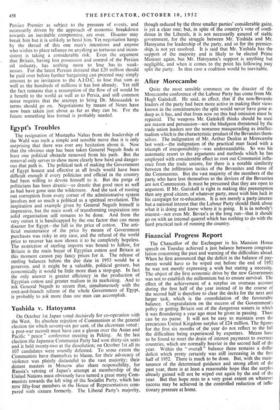Yoshida v. Hatoyama
On October 1st Japan voted decisively for co-operation with the West. Its absolute rejection of Communism at the general election (in which seventy-six per cent. of the electorate voted : a post-war record) must have cast a gloom over the Asian and Pacific " peace " conference meeting in Peking. At the last election the Japanese Communist Party had won thirty-six seats and it held twenty-two at the dissolution; on October 1st all its 107 candidates were soundly defeated. To some extent the Communists have themselves to blame, for their advocacy of violence was plainly distasteful to the vast majority; their distant masters in Moscow also share responsibility, for Russia's vetoing of Japan's attempt at membership of the United Nations must obviously have turned a great many Com- munists towards the left wing of the Socialist Party, which has now fifty-four members in the House of Representatives com- pared with sixteen formerly. The Liberal Party's majority, though reduced by the three smaller parties' considerable gains, is yet a clear one; but, in spite of the country's vote of confi- dence in the Liberals, it is not necessarily assured of stable government; for the struggle between Mr. Yoshida and Mr. Hatoyama for leadership of the party, and so for the premier- ship, is not yet resolved. It is said that Mr. Yoshida has the support of the majority and is likely to be elected Prime Minister again, but Mr. Hatoyama's support is anything but negligible, and when it comes to the point his following may split the party. In that case a coalition would be inevitable.


































 Previous page
Previous page